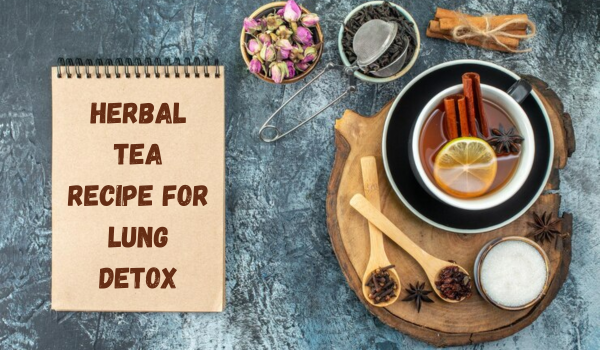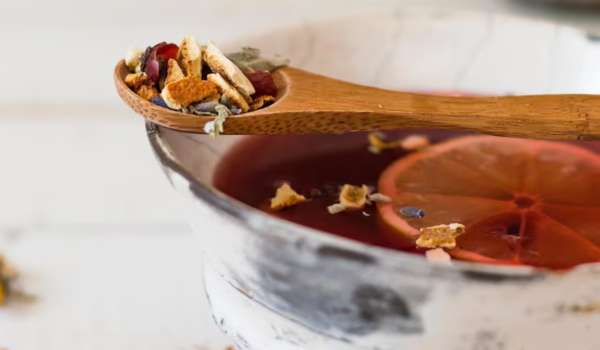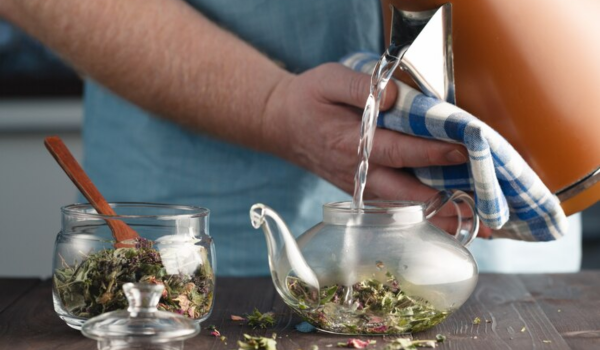Herbal Tea Recipe for Lung Detox | Natural Respiratory Cleanse
Herbal Tea Recipes for Lung Detox: A Natural Path to Respiratory Wellness

In the modern world, our lungs are constantly exposed to various pollutants, allergens, and toxins.
While the body has natural mechanisms to detoxify and protect the respiratory system, these processes can benefit from additional support, especially when exposed to environmental stressors for prolonged periods.
One of the most time-tested and soothing ways to aid respiratory health is through herbal teas. Used for centuries across cultures, these natural remedies help to soothe inflammation, clear mucus, and support the lungs’ self-cleansing abilities.
Rich in plant compounds with healing properties, herbal teas offer a gentle yet effective way to promote lung detoxification and overall well-being.
In this comprehensive guide, you’ll discover powerful herbal tea recipes crafted specifically to support lung detox.
We’ll explore the science behind their ingredients, the best ways to prepare and consume them, and how to incorporate them into your daily wellness routine for lasting respiratory vitality.
Understanding Lung Detoxification
Before diving into specific herbal teas, it’s essential to understand what lung detoxification entails. The lungs are self-cleaning organs that utilize mechanisms like cilia, mucus production, and immune cells to trap and expel harmful substances.
However, chronic exposure to irritants such as smoking, air pollution, and respiratory infections can overwhelm these natural defenses.
Supporting lung health through herbal remedies can aid in clearing mucus, reducing inflammation, and enhancing overall respiratory function.
Herbal Teas for Lung Detox
1. Mullein Tea
Mullein (Verbascum thapsus) is a time-honored herb known for its respiratory benefits. It acts as an expectorant, helping to loosen and expel mucus from the lungs.
Additionally, mullein has anti-inflammatory properties that soothe irritated airways, making it beneficial for conditions like asthma and bronchitis.
Preparation:
- Steep 1 teaspoon of dried mullein leaves in a cup of hot water for 10–15 minutes.
- Strain thoroughly to remove any fine hairs that may irritate the throat.
- Add honey or lemon if desired.
Benefits:
- Clears mucus from the lungs.
- Soothes inflammation in the respiratory tract.
- Supports overall lung health.
2. Ginger Tea
Ginger (Zingiber officinale) is renowned for its anti-inflammatory and antioxidant properties. It helps reduce inflammation in the airways, making breathing easier. Ginger also aids in breaking down mucus, facilitating its expulsion from the lungs.
Preparation:
- Boil 1 cup of water with 1 teaspoon of freshly grated ginger for 8–10 minutes.
- Strain and add honey or lemon to taste.
Benefits:
- Reduces airway inflammation.
- Promotes mucus clearance.
- Enhances overall respiratory function.
3. Peppermint Tea
Peppermint (Mentha piperita) contains menthol, which acts as a natural decongestant. It helps relax the muscles of the respiratory tract, easing breathing. Peppermint also has antibacterial properties that can help combat respiratory infections.
Preparation:
- Steep a handful of fresh peppermint leaves or 1 teaspoon of dried leaves in a cup of hot water for 5–7 minutes.
- Strain and enjoy.
Benefits:
- Relaxes respiratory muscles.
- Reduces inflammation in the airways.
- Relieves congestion.
4. Licorice Root Tea
Licorice root (Glycyrrhiza glabra) has been used in traditional medicine for its soothing properties.
It helps reduce inflammation and irritation in the airways, making it beneficial for conditions like sore throat and bronchitis. Licorice root also acts as an expectorant, aiding in the removal of mucus.
Preparation:
- Simmer 1 teaspoon of dried licorice root in a cup of water for 10–15 minutes.
- Strain and drink in moderation.
Benefits:
- Soothes irritated airways.
- Acts as an expectorant.
- Reduces inflammation in the respiratory tract.
5. Eucalyptus Tea
Eucalyptus (Eucalyptus globulus) contains cineole, a compound known for its decongestant and anti-inflammatory properties.
It helps loosen mucus and clear the airways, making it beneficial for conditions like asthma and chronic obstructive pulmonary disease (COPD).
Preparation:
- Steep 1 teaspoon of dried eucalyptus leaves in a cup of hot water for 5 minutes.
- Strain and sip slowly.
Benefits:
- Loosens mucus in the airways.
- Reduces inflammation in the respiratory tract.
- Eases breathing.
6. Thyme Tea
Thyme (Thymus vulgaris) is rich in thymol, a compound with antimicrobial properties. It helps fight respiratory infections, soothes coughs, and improves lung function.
Preparation:
- Steep 1 teaspoon of dried thyme in a cup of hot water for 7–10 minutes.
- Strain and drink warm.
Benefits:
- Fights respiratory infections.
- Soothes coughs.
- Improves lung function.
7. Green Tea
Green tea is rich in catechins, powerful antioxidants that help protect lung tissue from oxidative stress, a major contributor to chronic lung conditions.
The catechins, particularly epigallocatechin gallate (EGCG), have been shown to reduce inflammation and even inhibit the growth of certain harmful bacteria and viruses that target the respiratory tract.
Preparation:
- Heat water to about 80°C (175°F) and do not boil, as high temperatures can destroy delicate catechins.
- Add 1 teaspoon of high-quality green tea leaves or 1 green tea bag.
- Steep for 2–3 minutes.
- Strain and enjoy. Add a squeeze of lemon to enhance antioxidant absorption.
Benefits:
- Protects lungs from oxidative damage.
- Enhances immune response.
- Supports detoxification of pollutants from the body.
- Aids in weight loss, which indirectly benefits respiratory efficiency.
Pro Tip: Combine green tea with a pinch of matcha powder for an extra antioxidant punch!

Comparative Table: Best Herbs for Lung Detox
| Herb | Primary Benefit | Best Use Case | Form |
| Mullein | Mucus expectorant | Congestion, bronchitis | Dried leaves |
| Ginger | Anti-inflammatory, warming | Cold weather, chest tightness | Fresh root/powder |
| Peppermint | Natural decongestant | Sinus pressure, blocked airways | Fresh/dried |
| Licorice Root | Soothing, antiviral | Sore throat, lingering cough | Dried root |
| Eucalyptus | Bronchodilator, antimicrobial | Asthma, viral infection | Dried or steam |
| Thyme | Antibacterial, lung tonic | Cough, respiratory infections | Fresh/dried |
| Green Tea | Antioxidant, anti-inflammatory | Daily protection, wellness | Loose leaf/bag |
| Osha Root | Circulatory stimulant | Stubborn mucus, wheezing | Dried/sliced |
Seasonal Lung Detox Tea Recipes
Winter Lung Defense Tea
Perfect for flu season, this tea warms the body, fights infection, and reduces congestion.
Ingredients:
- 1 tsp dried mullein
- 1 tsp grated fresh ginger
- 1 tsp dried thyme
- Pinch of cinnamon
- 1 tsp raw honey (add after steeping)
Directions:
- Simmer herbs in 2 cups of water for 15 minutes.
- Strain, cool slightly, and add honey.
- Drink 1–2 cups daily during the col season.
Spring Allergy Relief Tea
Great for reducing histamine reactions and clearing pollen-related congestion.
Ingredients:
- 1 tsp dried peppermint
- 1 tsp dried nettle leaf (natural antihistamine)
- 1/2 tsp dried licorice root
- Fresh lemon slice
Directions:
- Steep ingredients in hot water for 10 minutes.
- Strain and drink before outdoor exposure or bedtime.
Summer Citrus Lung Cleanse
Light, refreshing, and packed with antioxidants to combat pollution-related inflammation.
Ingredients:
- 1 tsp green tea
- 2 lemon verbena leaves (or lemon balm)
- 1 slice fresh orange or lemon
- 1/4 tsp turmeric powder + pinch of black pepper
Directions:
- Steep green tea and herbs in hot (not boiling) water for 5 minutes.
- Add citrus and turmeric after steeping.
- Chill for an iced tea option.
How to Source the Best Herbs for Lung Health?
To maximize the therapeutic effects of your lung detox teas:
✅ Buy organic herbs whenever possible to avoid pesticide residues.
✅ Use loose-leaf herbs instead of tea bags they’re fresher and more potent.
✅ Store herbs in airtight containers away from light and moisture.
✅ Choose suppliers with third-party testing for purity and safety, especially for roots and imported herbs.
DIY Herbal Tea Blends for Lung Detox
Ultimate Lung Detox Tea Blend
Ingredients:
- 1 tbsp dried mullein leaf
- 1 tsp dried thyme
- 1 tsp licorice root
- 1 tsp dried peppermint
- 1/2 tsp ground ginger or fresh slices
- Optional: pinch of cinnamon for flavor and extra anti-inflammatory benefit
Directions:
- Combine herbs in a teapot or infuser.
- Pour 2 cups of boiling water over the herbs.
- Steep for 10–15 minutes.
- Strain and sweeten with honey (optional).
Recommended use: Enjoy 1–2 cups daily for lung support and mucus clearance.

The Science Behind Lung-Detox Herbal Teas
While herbal teas are often passed down as traditional remedies, modern research has begun to validate their therapeutic effects:
- Mullein has been shown in some studies to have anti-inflammatory and antiviral properties, supporting its traditional use for respiratory conditions.
- Ginger contains gingerols and shogaols, compounds with potent anti-inflammatory effects.
- Thymol in thyme is a well-documented antimicrobial, effective against bacteria and viruses causing respiratory issues.
- Cineole, found in eucalyptus, has mucolytic (mucus-breaking) and bronchodilating effects.
These phytochemicals interact with your body’s immune and respiratory systems, helping to modulate inflammation, thin mucus, and clear airways.
Herbal Tea + Breathwork: A Holistic Routine
For best results, pair your daily tea ritual with simple breathwork exercises to activate your lungs and improve oxygen flow. Try this:
5-Minute Morning Lung Routine
- Sip on a warm cup of mullein + ginger tea.
- Sit in a quiet space and take 5 deep belly breaths.
- Practice box breathing: Inhale 4 seconds → Hold 4 → Exhale 4 → Hold 4.
- Stretch your arms above your head with each inhale.
- Finish with 3 slow exhales through the mouth.
You’ll feel lighter, clearer, and more energized throughout the day.
Lifestyle Tips to Support Lung Detox
Drinking herbal teas is only part of a holistic approach. Here’s how to amplify the effects of your detox regimen:
- Practice Deep Breathing: Engage in daily breathing exercises or pranayama (yogic breathing) to increase lung capacity and oxygen intake. Techniques like box breathing and alternate nostril breathing are especially beneficial.
- Stay Hydrated: Water is essential to keep mucus thin and help eliminate toxins from the lungs and body.
- Avoid Environmental Toxins: Limit exposure to cigarette smoke, air pollution, and chemical cleaning products. Use an indoor air purifier and include houseplants like snake plant and peace lily to help clean the air.
- Exercise Regularly: Aerobic activities increase respiratory rate and help expel pollutants from the lungs.
- Steam Inhalation: Use eucalyptus or peppermint essential oil in a steam bowl to open nasal passages and loosen congestion.
Conclusion
Supporting your respiratory system doesn’t have to be complicated or costly. A warm cup of herbal tea rich in nature’s finest healing compounds can provide daily nourishment for your lungs, help eliminate toxins, reduce inflammation, and even enhance immunity.
Whether you’re recovering from exposure to pollutants, managing a respiratory condition, or simply striving for optimal wellness, these herbal tea recipes for lung detox offer a gentle, effective, and time-honored solution.
From mullein and ginger to eucalyptus and green tea, each herb brings unique benefits to the table. Combined thoughtfully, they form a powerful natural regimen that works in harmony with your body’s detox systems.
Paired with proper breathing exercises, hydration, clean air, and a healthy lifestyle, these teas can transform your lung health over time.
Explore our guides, join our community, and sip your way to a stronger, clearer breath one herbal infusion at a time. Breathe deep. Heal naturally. Live fully.
.